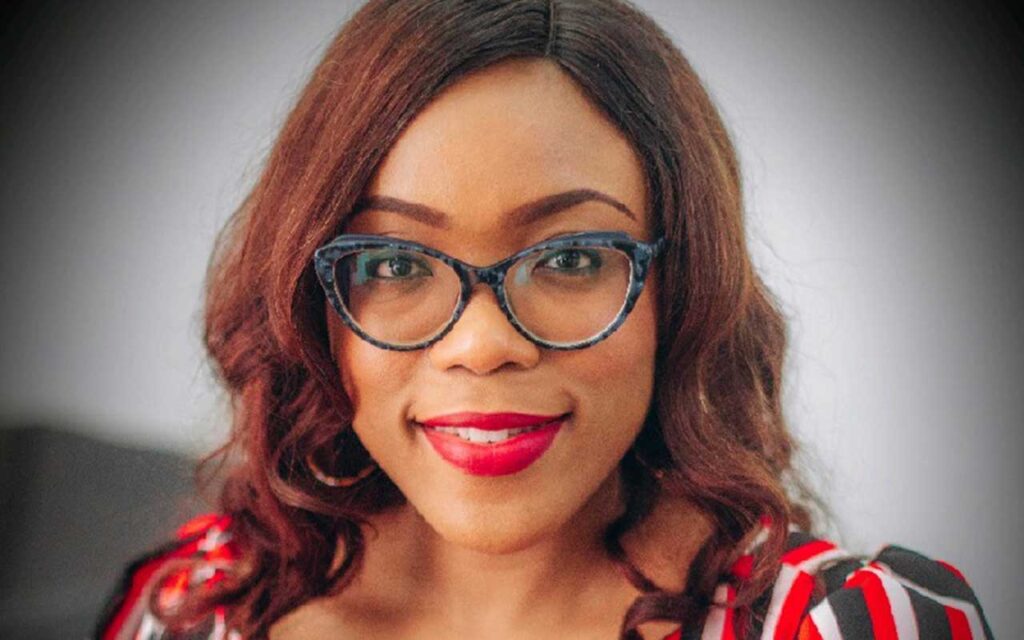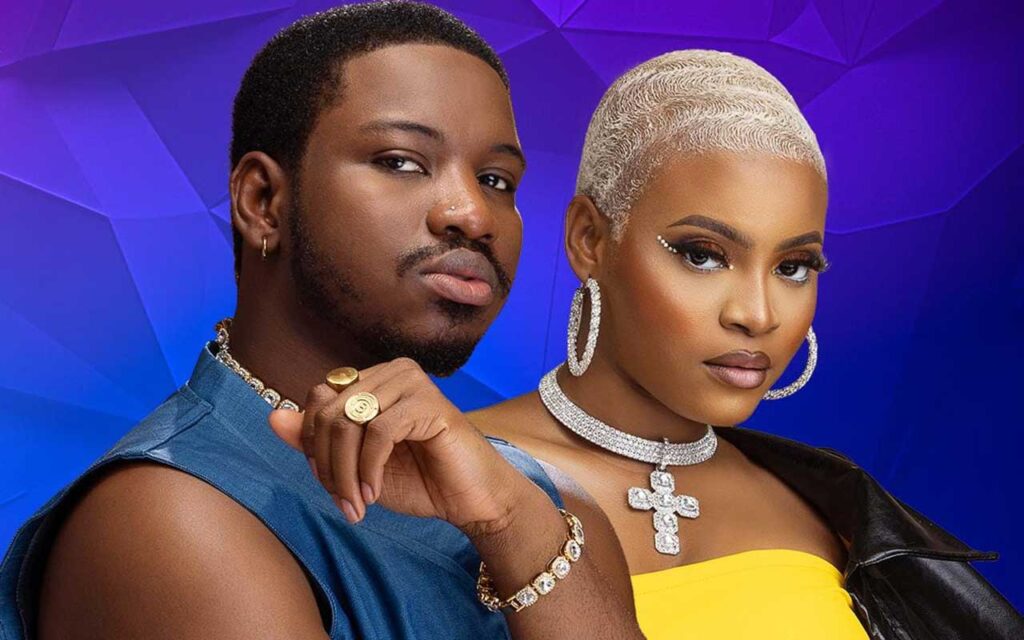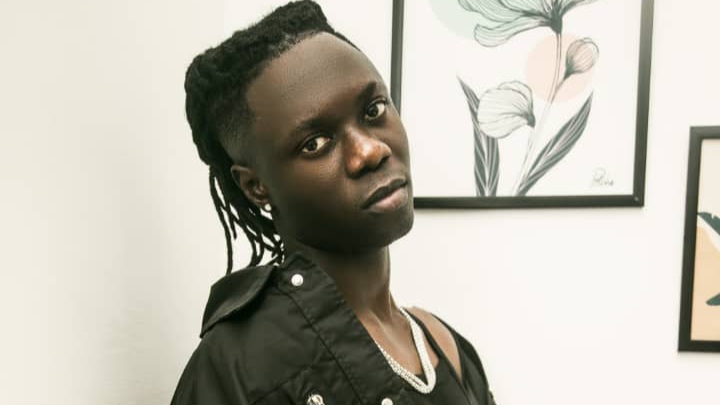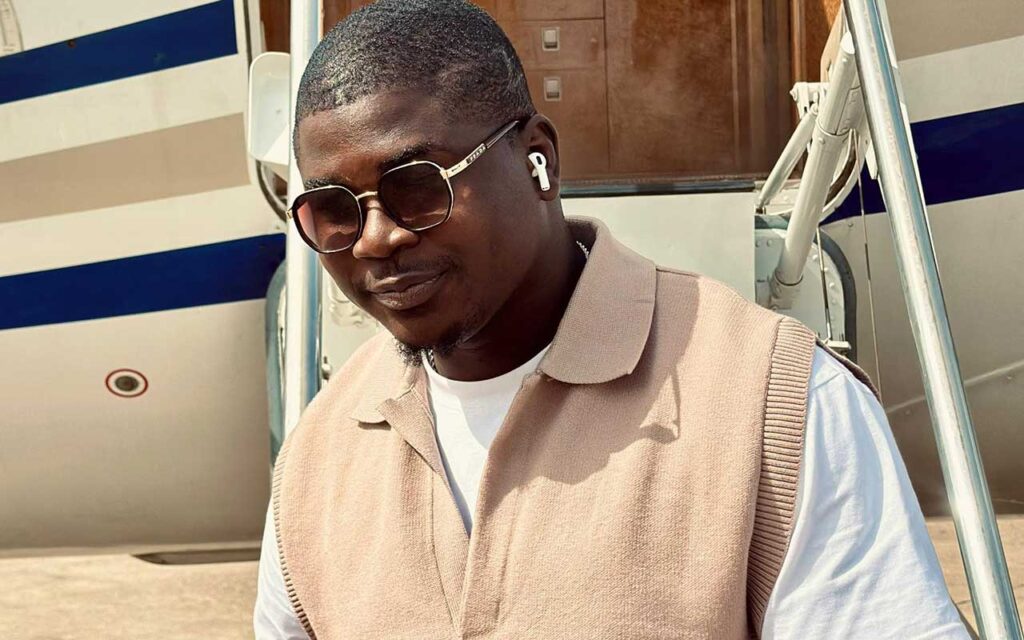 Within the animalia, there’s an interesting feature of mammals where they emit sound waves and use the reverberation as a compass to find prey and avoid predators. This adaptive ability, known as echolocation, is also common among blind humans who use rapid cane taps to assess their environment.
Within the animalia, there’s an interesting feature of mammals where they emit sound waves and use the reverberation as a compass to find prey and avoid predators. This adaptive ability, known as echolocation, is also common among blind humans who use rapid cane taps to assess their environment.
For others who tend to romanticize life, echolocation represents a purge of self, with emotions acting as sound waves to identify and connect with other equally-yoked people. It’s the grand playbook of Nigerian RnB maestro Mannie Akumba, whose recent work, Echolocation, reverberates as an invitation to purge self and embrace vulnerability.
Within the nine-track masterpiece, Mannie Akumba, born Emmanuel Msendoo Akumba, opens the curtains into his trauma as a serially scorned hopeless romantic. From the opening track, ‘Bounce Back’, Mannie sets a scene of rejection, weaving the melodies with his lithe vocals and silky cadences. At the third track, ‘I’m Not Gonna Wait For U’, Mannie’s imagery cuts sharper, as he bickers over his estranged lover’s distance. His melancholy drenches the album’s bouncy programming with a salty feel, and the range of emotions only get stronger across the remaining tracks. By the album’s final act, he climaxes the stories into a tragicomedy, leaning into the salve of hedonism — sex and marijuana — and the pillow of friendship.
On Echolocation, Mannie Akumba also flexes production whiz, flipping records like Patrick Watson’s ‘Je te laisserai’ — the 2010 ballad from the Montreal-based singer that’s making a comeback on TikTok — on the album’s closer ‘Tree House’. On other songs like the twin-track ‘Black Jack/Restitution’, he employs dramatic transitions and airy disco programming, while flexing his falsetto on the ambient-filled tracks, ‘Indica (Gaia’s gift)’, and ‘Mannierotica’. Without any duets, Mannie makes a royal ascent into the libraries of evergreen neo-RnB discographies in Nigeria’s music scene.
Having crashed into the music scene, in 2020, abandoning a budding career as a veterinary doctor, Mannie Akumba crept up on popular radars in Afrobeats with debut track, ‘Synonym’. The next three years would birth a creative flow-state that resulted in four studio EPs (Limbo, Bloom & Bramble, The Vaccine, and Timeline) that combusted the boundaries of creative expression within the young bard.
Catching up with The Guardian, the soft-toned maverick takes us on a tour round his sonic-verse; detailing his muses; come-up journey; creative process; as well his vision to become one of the greatest bohemian bards of his time.
How are you doing now?
I’m good, man. Just the regular hustle,the regular Nigerian lifestyle of trying to balance work and music. Yeah, I’m just trying to make sense out of the craziness that’s going on.
Is that why you made echolocation?
Echolocation is more from a romantic and pseudo personal perspective, so it doesn’t concern Nigeria. If somebody was to think about making a song for Nigeria, you would end up spending years in a studio. Now is not the time for that.
So, essentially, what does Echolocation dive into?
I don’t want to go too scientific, but in the animal kingdom, it has to do with Whales, dolphins and bats. So bats for example, how bats communicate or how bats, you know, navigate their environment is through what we call “Echolocation”. Now what this bat does is, it puts out sounds and then these sounds bounce off objects or bounce off prey, and then they’re able to navigate their environment and know where a prey is and where an obstacle is, so they can dodge or approach. For dolphins or whales in the oceans, they make sounds in the oceans and these waves bounce off prey. And then they know okay, this is the location of the prey and this is where I’m supposed to go to get food or get whatever it is. So that was the entire concept of the project. Which is why the first track is called “Bounce Back”. Echolocation just circumnavigates the gamble of love. Because I’m putting out you know, emotions I’m putting out love out there, and then it is not been reciprocated; In the instance of the project where I’m putting out love, I’m putting out everything I have and everything I’ve got in the relationship, but it is not being reciprocated and paid back to me, so it’s not balanced. Hence, I’m gambling on a relationship that, you know, I’m on the losing side at all times.
So Echolocation is like a journey of me, basically realizing how much I’ve lost and how much I’m losing in the relationship, which would summate to the end, where I start to gain reality of the fact that I’m not benefiting in the relationship, and I’m only losing. So Echolocation is the sending of signals of love, the communication and then the gamble basically. Which is why one track in particular, “Black Jack/Reinstitution”, used a lot of metaphorical language from the game of black jack which you know, is a card game. So it really highlights how Echolocation is the gamble of love; where I’m putting out as I said earlier, love and then not getting anything in return.
So progressing from “Timeline” EP to “Echolocation”, what were you essentially trying to announce in your artistry?
Okay, so “Timeline” yeah, I would say is like the foreboding of “Echolocation”. So “Timeline” is just like the eclipse of the relationship. Timeline as a body of work, though not as intricate as “Echolocation”, It still highlights certain aspects of a relationship that was crumbling, a relationship that was breaking. So in “Timeline”, I was able to not only highlight romantic relationships, I was able to highlight you know, a relationship with mother and son as well; In the fifth song on the project which is called “Timeline”. Yeah, so I used it to talk about the relationships I had with my late mom, and you know, I was able to translate that relationship to also apply to a romantic relationship with someone who, you know, you’re missing or someone who is no longer a part of you. And then “Echolocation“ is a project that now completely highlights a relationship, which I thought I needed. But I didn’t actually need, you get? So “Echolocation” is basically telling a story of how someone is trying to fight an already lost battle. Or trying to, you know, reclaim someone who doesn’t necessarily want to be reclaimed or wants to be even in a relationship with me.
You seem to have a variety of styles that are at your disposal. How did you pick up all of them?
Yeah, so I was born in a music family. My mom was a chorister. My father is a music lover. All my siblings are intense music lovers and they had a very huge influence on the style of music and the type of music that I listen to. So I would give credit most mostly to my eldest brother, because I’m the last child of four. The firstborn is, you know, he’s a dancer and a musician. He loves music, just like the second and the third. But growing up, I always listened to different kinds of music from my parents, my uncles and my siblings, and it’s crazy how I’ve always been surrounded by music since childhood up till now. I don’t think I’ve gone about my day without listening to music for probably the past 15 or 20 year; I’ve listened to music every day of my life. So I listen to a variety of genres from pop music, jazz, r&b; heavy on r&b. You know, electronic music, even Chinese folklore, crazy! I just listen to a large variety. But in the center of it all, my biggest influence is and was Beyonce, which is crazy to a lot of people when I tell them that she is my biggest influence and my biggest inspiration. They are always surprised, but that’s my biggest influence.
That’s the person that I have studied for the past 20 plus years, and have been so in awe of how much she puts into her craft and how much she tries to, you know, reinvent herself with every rollout, with every album and every single. It’s like, it’s not just a hobby for her, this is her lifestyle. So it is something I’ve been able to adapt into my own craft. Then I’ve been influenced by many other artists like Usher, Musiq Soulchild, Chris Brown, Glenn Lewis, Phil Collins, Brandy, Frank Ocean, Sisqo, etc. Then rappers like Jay Z and Kendrick Lamar. I’ve even got a couple of rap songs but I haven’t put them out yet.
Because I also rap but you know, man’s got to test the waters first before I started putting out these projects. But yeah, I’ve really been surrounded by music all my life, so I’ve always had this performing persona, since childhood.
You mentioned being born in Kaduna, what type of music was popular there, in the early 2000s or late 90s?
You know, Kaduna actually was a house of talents. I don’t know about it now, because I’ve been struck with a lot of insecurity. But at the time, we were really surrounded by heavy r&b, pop music and gospel music. So, Glenn Lewis, Ginuwine, Usher, R.Kelly (Mario came much later but him too), Mary J. Blige, TLC, Toni Braxton, Destiny’s Child then Beyonce, as I said earlier. She was the one that I hand-picked and just made my fav. So while I listened to other artists, she was the center of everything.
Yeah, Chris Brown came much later, but he made me feel like I could pop in music at a very young age, Chris Brown and Wizkid. So all these guys I listened to from Afrobeats, down to r&b and other different genres. Because then in Kaduna, around, maybe six or seven in the morning, you’re already hearing loud-ass music from your neighbors or from my father and my uncles when they’re ironing clothes while listening to BoyZ II Men. I had no choice but to be musically inclined.
Let’s go into “Echolocation” again, what are the deepest tracks on that record that speak to you?
Actually all the tracks are really deep, and they all have their individual spark but I would say the deepest track for me and yeah, my most challenging track was probably “Black Jack/Reinstitution”, because at the time when I was trying to create the song, it was really crazy. I had a lot of painful thoughts in my head, so I reached out to my producer and I was like “Bruh, I need to make this record and I need it to be in two parts”. I wrote some parts of the sheet music and sent it to Zelly; his name is Zeldak. Zeldak then sent it to Auxfeel Music. So I had both of them come meet me at the studio, and then we created it from scratch. It was a hassle for them, because I knew that every time I called them it was going to be an issue because I like when you know, my producers are unbirdled. So I don’t like restrictions with them. I want them to be as creative as possible. And then while I was writing the song in the studio, I really had to tap into, not just the creative side of me, but you know, the emotional side of me as well.
So I wanted to create like an alter ego speaking to my current self. So, while the first part of the track is contemporary r&b, you’d see that it’s vulnerable, and emotional. That is where I’m talking about how I was cheated on and being heartbroken and the rest. Then the second part of the song which is “Reinstitution” is where I kind of reclaim my power, and I realize how much of a catch I am and how much of a drag this relationship has been to me. So which is why you know, I switch up the tempo and I start to kind of rap in it.
And then another track that I will say is very deep for me is “Treehouse”, because basically, since childhood, I had the notion that we human beings don’t really know what the hell we’re doing; we’re just living. Everything that you think is right is based on what you’ve learned from someone else and that person probably just concocted something in his head. You understand? So we don’t know what we’re doing. We don’t know where we’re going, but we’re going anyways, you understand? Everybody’s just trying to find meaning out of this, this big, blue ball that we live on. So if I eventually find what I feel is meaningful from life, I would not hesitate to let you know, I would not hesitate to show you because I feel that’s what we’re here for. We’re here to guide each other through this crazy-ass world. That’s why we have religion, that’s why we have community. Lowkey, we create conduits which people use to make meaning out of life. So yeah, “Tree House”, which is why it’s the album closer, is a very intricate, soulful and quite lyrical track I would say.
Also, the lead single, “Margarita”, off the EP. I did that song when I met with a producer, His name is Hundr3d. I met him once and I haven’t seen him till today.
That was the first time I met him and we made the song on the spot. I went to meet my mixing engineer, because he was mixing some tracks from this project, and then I saw the guy he was in the studio. I was like, “do you mind us doing something?” And he was like “yeah, sure!” because he actually wanted to meet with me for the longest. So that was the first time we met and then I told him “okay, I want you to play this. I want you to play that”. Because how I make my music is, I already have the melodies, the arrangements and the composition in my head. So I just guide the producers on how to bring it to life, because right now I’m still in my infancy in production. I don’t know how to manipulate the FL Studio or the Logic applications. So I just create melodies in my head and then guide them through on how I want to project to come out. And then in about 20-30 minutes we were done with the lead single. So yeah, the EP is very diverse and connected in a way, because you will be able to follow through the plot from the beginning of the track up till the end.
And yeah, another special song to me is “Indica (Gaia’s Gifts)”. “Indica” is like the sentimentalization of the marijuana plant. Do you understand? I don’t even smoke, but creativity has no inhibitions because I mean, like, I don’t need to experience something to be able to tell my story about something very perfectly. So I sentimentalized the marijuana plant and personified it. I made it like in form of a person, so I was speaking to Gaia, Mother Nature and thanking her for this “blessing” which she gave us, you know, which is the Indica, and then I also sampled a conversation that BBC News had with Bob Marley in the 80s or the 70s, where he was highlighting you know, the spiritual effects of the “herb”, where he said “it makes you a Rastafari”, haha. I’ve been around people who, you know, ingest marijuana and it gets weird when I see them just become a different person entirely. It either gives them a burst of creativity or you know, or it sedates them; It makes them very relaxed based on the strain of what they take. Then I knew that sedation comes off of smoking indica, which is why I made a song about indica and how it makes one relaxed and then takes one into a different realm where one doesn’t need to be judged, one doesn’t need to be, you know, stressed.
What do you want to essentially like, get out of your music?
Okay, so for me, I do not like to be confined to a particular genre. So I just want my listeners to expect something at all times, but do not have a particular thing to expect. Just know that Mannie Akumba is going to drop music and he’s going to drop MUSIC! So, just expect good music, but don’t expect a particular type of music, do you understand? Because I don’t like to be confined to genres and I like to tell stories with my songs, you know, I like to embody personalities with my songs. So once Mannie Akumba is dropping, just expect good music to come out. Don’t expect a particular type of sound because I could come up tomorrow with a full-on rap album. So yeah, that’s the kind of artist that I am. I like to reinvent myself.











